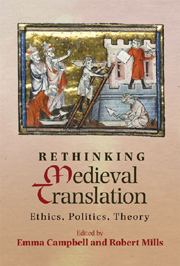Book contents
- Frontmatter
- Contents
- List of Illustrations
- List of Contributors
- Acknowledgements
- Introduction: Rethinking Medieval Translation
- 1 On Not Knowing Greek: Leonzio Pilatus's Rendition of the Iliad and the Translatio of Mediterranean Identities
- 2 Translation and Transformation in the Ovide moralisé
- 3 Translating Lucretia: Word, Image and ‘Ethical Non-Indifference’ in Simon de Hesdin's Translation of Valerius Maximus's Facta et dicta memorabilia
- 4 Translating Catharsis: Aristotle and Averroës, the Scholastics and the Basochiens
- 5 The Ethics of Translatio in Rutebeuf's Miracle de Théophile
- 6 Invisible Translation, Language Difference and the Scandal of Becket's Mother
- 7 Medieval Fixers: Politics of Interpreting in Western Historiography
- 8 The Task of the Dérimeur: Benjamin and Translation into Prose in Fifteenth-Century French Literature
- 9 The Translator as Interpretant: Passing in/on the Work of Ramon Llull
- 10 Rough Translation: Charles d'Orléans, Lydgate and Hoccleve
- 11 Bueve d'Hantone/Bovo d'Antona: Exile, Translation and the History of the Chanson de geste
- Untranslatable: A Response
- Bibliography
- Index
10 - Rough Translation: Charles d'Orléans, Lydgate and Hoccleve
Published online by Cambridge University Press: 05 April 2013
- Frontmatter
- Contents
- List of Illustrations
- List of Contributors
- Acknowledgements
- Introduction: Rethinking Medieval Translation
- 1 On Not Knowing Greek: Leonzio Pilatus's Rendition of the Iliad and the Translatio of Mediterranean Identities
- 2 Translation and Transformation in the Ovide moralisé
- 3 Translating Lucretia: Word, Image and ‘Ethical Non-Indifference’ in Simon de Hesdin's Translation of Valerius Maximus's Facta et dicta memorabilia
- 4 Translating Catharsis: Aristotle and Averroës, the Scholastics and the Basochiens
- 5 The Ethics of Translatio in Rutebeuf's Miracle de Théophile
- 6 Invisible Translation, Language Difference and the Scandal of Becket's Mother
- 7 Medieval Fixers: Politics of Interpreting in Western Historiography
- 8 The Task of the Dérimeur: Benjamin and Translation into Prose in Fifteenth-Century French Literature
- 9 The Translator as Interpretant: Passing in/on the Work of Ramon Llull
- 10 Rough Translation: Charles d'Orléans, Lydgate and Hoccleve
- 11 Bueve d'Hantone/Bovo d'Antona: Exile, Translation and the History of the Chanson de geste
- Untranslatable: A Response
- Bibliography
- Index
Summary
Equivalence and Competence
Translation is often associated with equivalence. The goal of the translator in modern times is to create a seamless transition between a text and its translation, which is supposed to be marked by the ‘absence of any linguistic or stylistic peculiarities’. ‘All that is foreign or strange’ should be ‘deleted, every rough corner smoothed’. Such an emptying out of the translator's role as a writer brings the reward of a reader who imagines that he or she is actually reading the original work. But this assumed achievement is impoverished by what many perceive as vitiating costs. Nabokov, while he was engaged in translating Pushkin, passionately exclaimed that the claim that ‘so-and-so's translation reads smoothly’ sent him into ‘spasms of helpless fury’. A ‘readable’ translation has merely ‘substituted easy platitudes for the breath taking intricacies of the text’. As well as Nabokov's amour propre about the kind of respect that should be offered to a great writer's work, there has been much passionate objection on ethical grounds. No translation is innocently neutral, nor should seek to be. Every lexical choice, every syntactic choice, is freighted with social and cultural assumptions that shape the resulting prose or poetry, sometimes in ways that work against or even betray the original text: traduttore/traditore [translator/traitor].
- Type
- Chapter
- Information
- Rethinking Medieval TranslationEthics, Politics, Theory, pp. 204 - 225Publisher: Boydell & BrewerPrint publication year: 2012



